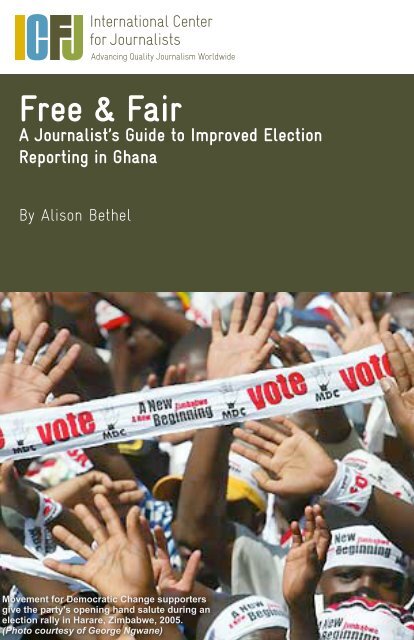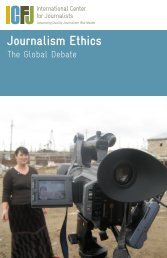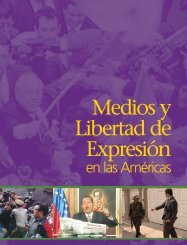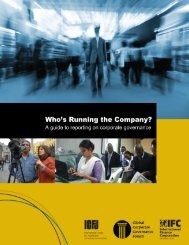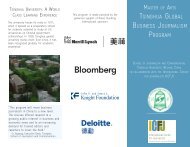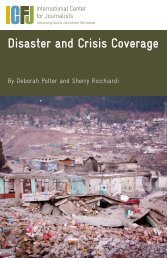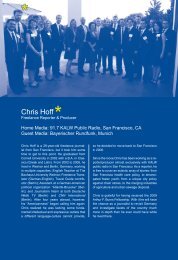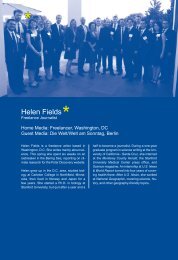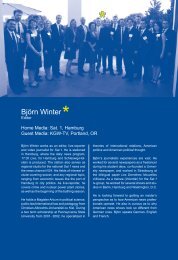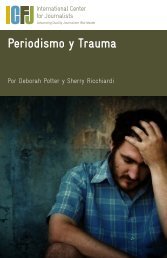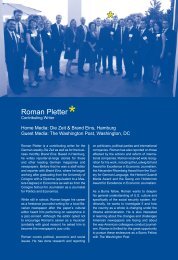Download PDF - International Center for Journalists
Download PDF - International Center for Journalists
Download PDF - International Center for Journalists
You also want an ePaper? Increase the reach of your titles
YUMPU automatically turns print PDFs into web optimized ePapers that Google loves.
Free & Fair<br />
A Journalist’s Guide to Improved Election<br />
Reporting in Ghana<br />
By Alison Bethel<br />
Movement <strong>for</strong> Democratic Change supporters<br />
give the party's opening hand salute during an<br />
election rally in Harare, Zimbabwe, 2005.<br />
(Photo courtesy of George Ngwane)
Acknowledgements<br />
Thanks to the staff of the <strong>International</strong> <strong>Center</strong> <strong>for</strong> <strong>Journalists</strong>, especially Emily<br />
Schult, Dawn Arteaga, Elisa Tinsley and the very talented Joi-Marie McKenzie.<br />
Also thanks to Mathews Ndanyi and Robert H. Magezi, both of whom I'm proud<br />
to call colleagues. Their experiences in Kenya and Rwanda, respectively, really<br />
brought life to this project. Finally, thanks to Canadian journalist Ross Howard<br />
who has done so much to train journalists and make them aware of the need <strong>for</strong><br />
conflict-sensitive journalism.<br />
About the Author<br />
Alison Bethel, Knight <strong>International</strong> Journalism Fellow in Ghana from 2008-2009,<br />
<strong>for</strong>merly was managing editor of The Nassau Guardian in the Bahamas. Bethel<br />
began her journalism career at The Boston Globe, where she was senior<br />
assistant city editor and deputy business editor covering business and health.<br />
She was features editor <strong>for</strong> The Detroit News, where she oversaw a staff of 43<br />
who produced seven daily sections and five weekly special sections covering<br />
food, health and fitness, Weekend, home and garden, and kids. Bethel then<br />
moved to Washington, DC, where she served <strong>for</strong> five years as The Detroit News’<br />
bureau chief. Be<strong>for</strong>e joining The Nassau Guardian, Bethel was the executive<br />
editor of the Legal Times. She is a graduate of Howard University, where she<br />
studied journalism and theater.<br />
About the <strong>International</strong> <strong>Center</strong> <strong>for</strong> <strong>Journalists</strong><br />
The <strong>International</strong> <strong>Center</strong> <strong>for</strong> <strong>Journalists</strong>, a non-profit, professional organization,<br />
promotes quality journalism worldwide in the belief that independent, vigorous<br />
media are crucial in improving the human condition. Since 1984, the <strong>International</strong><br />
<strong>Center</strong> <strong>for</strong> <strong>Journalists</strong> has worked directly with more than 50,000 journalists.<br />
Aiming to raise the standards of journalism, ICFJ offers hands-on training,<br />
workshops, seminars, fellowships and international exchanges to reporters and<br />
media managers around the globe.<br />
About Knight <strong>International</strong> Journalism Fellowships<br />
The Knight <strong>International</strong> Journalism Fellowships program makes tangible that<br />
improve the quality and free flow of news in the public interest. Funded by the<br />
John S. and James L. Knight Foundation, the year-long program sends<br />
international media professionals to countries where there are opportunities to<br />
promote reliable, insightful journalism that holds officials accountable. To learn<br />
more, visit www.knight.icfj.org
Contents<br />
1 Introduction<br />
3 Free & Fair: Improving Election Reporting<br />
• Seven Tips <strong>for</strong> Election Reporting<br />
• Good Journalism’s Unconscious Role in Covering Elections and<br />
Conflict<br />
• Checkpoints on Election Coverage in Conflict-Sensitive Situations<br />
• Lessons from Rwanda<br />
• The Role of the Media in Covering Polls and Conflict<br />
• Recommendations <strong>for</strong> African Countries in Post-Election Crisis<br />
• An Insight Into Media-Related Violence<br />
• Covering Budgets<br />
19 Additional Resources<br />
• Guidelines <strong>for</strong> Free and Fair Elections<br />
• Glossary
Free & Fair<br />
Introduction<br />
As African voters increasingly demand free and fair elections and move toward<br />
more democratic leadership, media are challenged with providing coverage that<br />
is more balanced, more honest and more detailed than ever be<strong>for</strong>e. After all, it is<br />
the essence of what journalists are supposed to do.<br />
In recent years, elections in countries across sub-Saharan Africa have been<br />
plagued by violence. In most circumstances, journalists are not equipped to deal<br />
with these volatile, confusing and often dangerous situations.<br />
Reporters, as well as their editors and newspaper owners, must be committed to<br />
reporting on campaign issues and the impact on the society at large and resist<br />
the temptation to sensationalize the news in order to sell newspapers or attract<br />
viewers or listeners. They must be committed to accomplishing this through nonpartisan<br />
reports and by giving each political party equal time to share their goals<br />
and strategies <strong>for</strong> reaching those objectives. Media do, indeed, have a certain<br />
level of social responsibility to avoid incendiary language or biased reporting that<br />
incites antagonism or conflict.<br />
Reporters must also avoid reporting on rumors and seek out new and diverse<br />
voices <strong>for</strong> their stories whenever possible. They should also embrace the need to<br />
sometimes expurgate inaccurate or potentially inflammatory language from<br />
political statements or speeches and always be aware of the words they choose<br />
to use in stories. As we have seen recently, words can be weapons, too.<br />
<strong>International</strong> <strong>Center</strong> <strong>for</strong> <strong>Journalists</strong>
Introduction<br />
By following these basic rules and<br />
universal journalism standards, media<br />
will be less likely to incite violence<br />
during and after political campaigns.<br />
As Canadian journalist and media<br />
consultant Ross Howard puts it,<br />
"Incompetent journalism and partisan<br />
news management can generate<br />
misin<strong>for</strong>mation which inflames<br />
xenophobia, ethnic hatred, class<br />
warfare and violent conflict in almost<br />
any fragile state.<br />
"Reliable reporting, and responsibly<br />
written editorials and opinion, do<br />
things such as establish<br />
communication among disputant<br />
parties, correct misperceptions and<br />
identify underlying interests and offer<br />
solutions," says Howard, author of<br />
Conflict Sensitive Reporting: A<br />
Handbook. "The media provides an<br />
emotional outlet. It can offer solutions,<br />
and build confidence."<br />
This manual is designed to help<br />
journalists in emerging democracies<br />
improve their coverage of presidential<br />
elections. It is also intended to help<br />
journalists navigate difficult, and often<br />
violent, situations that can sometimes<br />
follow elections in many regions of<br />
central and southern Africa.<br />
The hope is that journalists will come<br />
away with a better understanding of:<br />
1. The media's role in elections.<br />
2. The need to be fair and impartial in<br />
all coverage involving political<br />
campaigns.<br />
3. The impact reporting can, and<br />
sometimes should, have on<br />
readers, listeners and viewers.<br />
4. How to navigate ethical dilemmas.<br />
You will also find in these pages<br />
advice and reflections from journalists<br />
who have been in the thick of political<br />
mayhem in recent years, including<br />
radio journalist Mathews Ndanyi of<br />
Kenya and reporter/copyeditor Robert<br />
Magezi of Rwanda.<br />
Mr. Ndanyi recalls vividly the violence<br />
that broke out during and after the<br />
2007 elections and reflects on the<br />
mistakes the media made, including<br />
himself. Nearly six months after more<br />
than 1,000 people were killed, he is<br />
honest about what has to change in<br />
the profession so the media don't<br />
unwittingly spark protests and, in<br />
some cases, deaths.<br />
After last year's vote and the resulting<br />
post-election violence, Ndanyi took<br />
part in three days of training <strong>for</strong> 30<br />
Kenyan journalists on conflictsensitive<br />
reporting. The workshop's<br />
main goal was to in<strong>for</strong>m journalists of<br />
how their choice of words can incite<br />
conflict -- words like "militiamen" and<br />
"ethnic cleansing."<br />
"We learned which words to apply<br />
when writing a story. Now I know<br />
better," Ndanyi said after the training.<br />
In Rwanda, one particular radio<br />
station was credited with sparking bad<br />
feelings among ethnic groups with the<br />
words it chose to blast over the<br />
airwaves. What resulted was a<br />
massive genocide.<br />
Robert Magezi recalls the events that<br />
led up to the violence of 1995. He<br />
cautions other journalists to choose<br />
the right words when writing and to<br />
constantly remember their role as<br />
reporters of the facts when covering<br />
elections.<br />
5
Free & Fair: Improving Election Reporting<br />
Free & Fair: Improving Election<br />
Reporting<br />
Seven Tips <strong>for</strong> Election Reporting<br />
Stick to the issues. Watch out <strong>for</strong> candidates who employ clever public<br />
relations tactics that have nothing to do with real election issues. Some<br />
candidates find they can call more attention to themselves by launching a<br />
hate campaign against their opponents (personal family values is a<br />
favorite topic) rather than addressing important issues like the economy<br />
and jobs.<br />
Beware of exaggerating controversy. Too often on a day when a story<br />
doesn’t hit us in the face, some reporters and editors create and then<br />
exaggerate a potential conflict. Better to let that day pass without a 20-<br />
second sound bite or a byline.<br />
Equal time <strong>for</strong> all. Keep a meticulous running score on space and play<br />
(front page, inside) given to each candidate. Uneven reporting is the most<br />
certain way to lose credibility and readers.<br />
Don’t <strong>for</strong>get the voter. Reporters should keep up with what the voters<br />
are thinking, not only through polls and man-in-the-street quick quotes,<br />
but by meaningful probing of how families are surviving. Remember to
Free & Fair: Improving Election Reporting<br />
cover the regions and not just key<br />
areas of the country.<br />
Beware of “poll-itis.” Polls can be<br />
useful, but they can be overused and<br />
manipulated. A reader will be better<br />
served by more old-time regional<br />
reports with interviews and<br />
predictions from voters and field<br />
experts.<br />
Don’t over-analyze. Much of the<br />
energy and time devoted to analyzing<br />
the candidates’ every move would be<br />
better utilized telling readers what<br />
voters think rather than what a deskbound<br />
dreamer, with a license to<br />
sway, wishes would happen.<br />
Beware of “creeping legitimacy.”<br />
Creeping legitimacy occurs when one<br />
news organization (usually a not-soreliable<br />
one) publishes a story based<br />
on a rumor or one source and other<br />
media houses follow suit out of fear<br />
of missing the story. News<br />
organizations should apply the same<br />
reporting standards of their own<br />
investigative ef<strong>for</strong>ts (double check<br />
every fact) to any political campaign<br />
rumors and scandals. The reporter<br />
must never serve as a mere conduit<br />
<strong>for</strong> unchecked personal in<strong>for</strong>mation<br />
on a candidate, especially from a<br />
questionable source. Stick by your<br />
own standard of fact-checking be<strong>for</strong>e<br />
pulling the trigger.<br />
(From an article by Thomas Winship,<br />
founder and <strong>for</strong>mer chairman of the<br />
board of the <strong>International</strong> <strong>Center</strong> <strong>for</strong><br />
<strong>Journalists</strong> in Washington, D.C., and<br />
<strong>for</strong>mer editor of The Boston Globe.<br />
Written <strong>for</strong> Editor & Publisher, Oct. 3,<br />
1992)<br />
Good Journalism’s<br />
Unconscious Role in<br />
Covering Elections and<br />
Conflict:<br />
• Channeling communication. The<br />
two sides speaking to each other<br />
through the media.<br />
• Educating. Exploring each side's<br />
struggle to move towards<br />
reconciliation.<br />
• Confidence-building. Reducing<br />
suspicion and fear and showing that<br />
reconciliation is possible and what<br />
local ef<strong>for</strong>ts are being made.<br />
• Correcting misperceptions of<br />
each side and encouraging them to<br />
revise their views of each other.<br />
• Making "them" human. Giving<br />
each side names, faces, and voices<br />
and describing how the issues affect<br />
them.<br />
• Identifying underlying interests.<br />
Asking the tough questions and<br />
getting out the real message beyond<br />
leaders' interests.<br />
• Emotional outlet. Allowing both<br />
sides to speak their grievances.<br />
• Framing the conflict. Describing<br />
the problem in a way that reduces<br />
tension and leads to negotiation.<br />
• Face-saving, consensus<br />
building. Highlighting ef<strong>for</strong>ts of<br />
leaders and reaching their<br />
constituencies, including refugees<br />
and exiles, with that in<strong>for</strong>mation.<br />
7
Free & Fair<br />
• Solution-building. Publicizing<br />
steps of solution building on a daily<br />
basis.<br />
• Encouraging a balance of power.<br />
Fostering negotiations and focusing<br />
on a power balance in hearing<br />
grievances and seeking solutions.<br />
Opposition supporters brandish<br />
crude weapons during protests in<br />
Nairobi December 31, 2007.<br />
(Reuters)<br />
Checkpoints on Election<br />
Coverage in Conflict<br />
Sensitive Situations<br />
• De-emphasize the "two opposing<br />
sides," reporting in favor of<br />
including voices of all who are<br />
affected.<br />
• Avoid quoting the leaders by<br />
quoting ordinary people.<br />
• Report on common ground more<br />
than division.<br />
• Treat suffering of all sides.<br />
• Avoid inflammatory language like<br />
"devastation" and emotional or<br />
imprecise words like "massacre,"<br />
instead, use the more specific<br />
"deliberate killing of innocent,<br />
unarmed civilians..."<br />
• Avoid language that takes sides<br />
like "terrorist" and substitute what<br />
people call themselves.<br />
• Avoid making opinion into fact --<br />
use a person's name with their<br />
opinion.<br />
• Don't wait <strong>for</strong> leaders to suggest<br />
solutions. Explore peace, put<br />
ideas to the leaders, and report<br />
their responses.<br />
“You must understand the<br />
impact reporting can...<br />
have on readers,<br />
listeners and viewers.”<br />
Lessons from Rwanda<br />
What the Media Learned<br />
Media can be used as a tool <strong>for</strong><br />
national security and unity by putting<br />
peace as the first priority.<br />
Journalist's should take away lessons<br />
from a country's political, cultural and<br />
social history so they can downplay<br />
violence and other undesirable<br />
situations.<br />
Media should be as neutral as<br />
possible to avoid pushing an already<br />
tense situation into bloodshed, like the<br />
case with Rwandan genocide.<br />
-- Rwandan journalist Robert Magezi<br />
-- from "Conflict Sensitive Reporting:<br />
A Handbook," by Ross Howard<br />
<strong>International</strong> <strong>Center</strong> <strong>for</strong> <strong>Journalists</strong>
Free & Fair: Improving Election Reporting<br />
The Role of the Media in<br />
Covering Polls and Conflict<br />
The Kenyan Experience<br />
Kenyan journalist Mathews<br />
Mdanyi, 36, reported on the<br />
country's Dec. 27, 2007,<br />
elections and the violence<br />
that followed and led to<br />
more than 1,000 deaths.<br />
Ndanyi continued to report,<br />
despite threats from voters<br />
and politicians. He shares<br />
the lessons he learned<br />
be<strong>for</strong>e, during and after the<br />
election.<br />
By Mathews Ndanyi<br />
KENYA -- The<br />
2007 elections and<br />
the resulting<br />
violence presented<br />
critical<br />
professional<br />
challenges which<br />
most journalists in<br />
Kenya had never<br />
experienced.<br />
Covering the elections and the conflict<br />
brought <strong>for</strong>th new experiences and<br />
lessons <strong>for</strong> journalists and at the end<br />
we, too, realized the importance of the<br />
media <strong>for</strong> any country.<br />
I was affected when I was displaced<br />
from my home during the violence,<br />
just like more than 500,000 other<br />
Kenyans. But the greatest lessons<br />
and challenges came in the line of my<br />
duty as a journalist.<br />
The media was in focus, and <strong>for</strong><br />
ordinary Kenyans it was more<br />
important to listen to radio, watch TV<br />
or buy a newspaper than buy a meal.<br />
The work of journalists was thus<br />
pivotal in the electoral process and the<br />
violence.<br />
The role of the media was so<br />
influential. <strong>Journalists</strong> faced the<br />
challenge of remaining focused on<br />
reporting objectively without bias or<br />
favor and presenting the facts as they<br />
were to help readers, listeners or<br />
viewers make in<strong>for</strong>med decisions.<br />
During the election, during the<br />
violence that led to the death of more<br />
than 1,200 people, and then through<br />
the healing process led by <strong>for</strong>mer U.N.<br />
Secretary General Kofi Annan of<br />
Ghana, the media was in the thick of<br />
things.<br />
As the country reviews what<br />
happened, it has clearly emerged that<br />
many institutions, including the media,<br />
had failed in their roles and in one way<br />
or another they did contribute to the<br />
Kenyan crisis.<br />
To date, the government and media<br />
stakeholders are still embroiled in a<br />
debate over the role of the media in<br />
the Kenyan crisis. Key commissions<br />
<strong>for</strong>med to probe the chaos have<br />
critically analyzed the positive and<br />
negative contributions of the media to<br />
the crisis.<br />
The failures and positive contributions<br />
by the Kenyan media during the<br />
elections serve as lessons or guides<br />
on how to handle elections and<br />
9
Free & Fair<br />
conflicts <strong>for</strong> journalists in Kenya and<br />
other African countries, like Ghana, if<br />
faced with a similar situation.<br />
Partisan Coverage<br />
Even in the most complex<br />
circumstances, journalists need to<br />
remain independently focused, fair,<br />
impartial, factual and objective.<br />
In Kenya, sections of the print and<br />
electronic media largely disregarded<br />
professional ethics and codes of<br />
conduct, instead choosing to be<br />
trumpets of individual, tribal or political<br />
party interests, which helped to<br />
polarize society.<br />
Government and Political<br />
Interference in Media<br />
A free and independent press helps to<br />
nurture democracy, human rights and<br />
the rule of law. When governments<br />
and power barons seek to muzzle the<br />
freedom of the press, then democracy<br />
and good governance are threatened.<br />
In Kenya, the government and<br />
politicians extensively interfered with<br />
the independence of the media,<br />
exerting pressure on journalists to<br />
demand favorable coverage during<br />
the polls.<br />
Many of us took sides openly in the<br />
way we covered the polls. From our<br />
stories, Kenyans could easily tell our<br />
bias, including which side a media<br />
house or a journalist supported.<br />
Kenya has five daily newspapers, four<br />
national TV stations, about 10 national<br />
radio stations and more than 80 other<br />
FM radio stations that broadcast<br />
mainly in vernacular languages to<br />
over 40 ethnic groups.<br />
Many vernacular FM stations have<br />
wide listenership and openly<br />
propagated interests of tribes, parties<br />
and politicians, thus stirring up anger<br />
and violence.<br />
What we have learned is that the<br />
media can instead help to harness the<br />
cultural, social and political diversities<br />
of a country <strong>for</strong> national good and that<br />
elections provide an opportunity <strong>for</strong><br />
journalists to objectively focus on<br />
critical issues rather than dangerous<br />
trivialities.<br />
A Ghanian election poster<br />
promoting a peaceful election<br />
Many journalists succumbed to<br />
external influence and, there<strong>for</strong>e,<br />
could not work independently. Threats<br />
to journalists, including myself, were<br />
massive. One of the Kiss FM editors<br />
had to escape from the country<br />
because of political intimidation.<br />
Meanwhile, many other journalists<br />
went underground <strong>for</strong> fear of their<br />
lives.<br />
<strong>International</strong> <strong>Center</strong> <strong>for</strong> <strong>Journalists</strong>
Free & Fair: Improving Election Reporting<br />
The state deployed agents to track<br />
journalists and tap their phones in<br />
moves that were intimidating.<br />
Such retrogressive acts undermine<br />
the development of strong,<br />
transparent and democratic<br />
institutions and it’s important <strong>for</strong><br />
government and politicians to always<br />
allow freedom of expression and the<br />
existence of a free media as a pillar of<br />
civilization.<br />
Conflict- Sensitive Reporting<br />
Elections can turn into violent conflicts<br />
as was the case in Kenya. The media<br />
can either help to aggravate the<br />
situation or restore order, depending<br />
on how journalists cover the situation.<br />
The elections and the ensuing<br />
violence made it difficult <strong>for</strong> many of<br />
us to cope with the situation<br />
personally while professionally<br />
carrying out our duties.<br />
<strong>Journalists</strong> had to exercise a high<br />
level of sensitivity <strong>for</strong> our own friends,<br />
families and colleagues and still<br />
understand the fact that our role had a<br />
direct impact on events.<br />
Even the choice of words to use in a<br />
story was important because the<br />
public was sensitive to the way we<br />
reported events.<br />
While covering events, I would use<br />
words in my stories without knowing<br />
or weighing their implication. I realized<br />
that in a conflict situation it’s important<br />
<strong>for</strong> journalists to understand the<br />
interests of each group, or individuals,<br />
and try as much as possible to remain<br />
factual and neutral while avoiding<br />
words or styles of reporting capable of<br />
heating up the conflict.<br />
I faced threats and attacks from mobs<br />
that disliked my style of reporting or<br />
the words I had used in stories during<br />
the poll violence. One time I referred<br />
to some youth as “militiamen” and the<br />
following day they stopped me at a<br />
road barricade demanding that I<br />
explain why I referred to them as<br />
militiamen and not what they thought<br />
they were -- “protestors.”<br />
A man injured in<br />
election violence in<br />
Zimbabwe<br />
During election campaigning, some<br />
terms used by politicians were picked<br />
up by the media and provoked angry<br />
reactions and even violence from<br />
opponents. Our use of terminologies<br />
like worriers, ethnic cleansing,<br />
massacres, gangs, or other tribal<br />
terminologies, during the violence also<br />
provoked anger from politicians and<br />
communities depending on who a<br />
writer was referring to.<br />
Later, I acknowledged the fact that<br />
some of the words I used in my stories<br />
may have helped to incite anger or<br />
harden feelings, thus aggravating the<br />
conflict.<br />
However, journalists should also be<br />
careful that self censorship does not<br />
undermine their work. At the height of<br />
the conflict in Kenya, editors agreed to<br />
give a blanket blackout on certain<br />
types of in<strong>for</strong>mation in a bid to calm<br />
11
Free & Fair<br />
down passions or encourage<br />
reconciliation. This can easily deny<br />
the public important in<strong>for</strong>mation.<br />
international intervention, which saved<br />
Kenya.<br />
All in all, journalists must be<br />
acquainted with techniques of conflictsensitive<br />
reporting so that during<br />
elections or conflicts they can<br />
continue to operate freely.<br />
Live Coverage and Scenes of<br />
Violence<br />
Live coverage of events both on radio<br />
and television is an effective way to<br />
communicate in<strong>for</strong>mation as it is<br />
happening. During the polls and the<br />
conflict in Kenya, live coverage of<br />
events sparked debates. Many<br />
political parties used live coverage of<br />
rallies as one way to reach out to<br />
larger audiences.<br />
Politicians were hosted on TV and<br />
radio <strong>for</strong> live shows or debates which<br />
captivated the country and impacted<br />
on political events.<br />
However, politicians and their<br />
supporters should not be allowed to<br />
take advantage of wide publicity to<br />
propagate sectarian interests or utter<br />
words that amount to incitement of<br />
one group against the other, as was<br />
the case in Kenya. The government<br />
banned live coverage fearing that<br />
politicians were using media to incite<br />
the public.<br />
Some of the scenes of violence aired<br />
on TV caused instant reaction across<br />
the country and sparked counter<br />
killings. However, this was not reason<br />
enough <strong>for</strong> the government to impose<br />
the ban on live coverage because the<br />
state had its own failures in dealing<br />
with the chaos. The live coverage of<br />
events by local and international<br />
media helped to attract quick<br />
It’s there<strong>for</strong>e important <strong>for</strong> the media<br />
in Ghana to carefully handle coverage<br />
of elections in a manner that will not<br />
undermine peace but also ensure that<br />
the public is adequately in<strong>for</strong>med.<br />
Media and Election Monitoring<br />
The media, through monitoring and<br />
coverage of election events, can help<br />
to ensure free and fair polls in any<br />
country. <strong>Journalists</strong> help to educate<br />
the public on the need to vote, expose<br />
irregularities, including rigging, and<br />
give the public authentic facts and<br />
figures.<br />
In Kenya, reporters were all over the<br />
country in an ef<strong>for</strong>t to monitor and<br />
independently report events during the<br />
elections. <strong>Journalists</strong> were quick in<br />
giving out in<strong>for</strong>mation or the results as<br />
the votes were counted and the same<br />
was broadcast nationally way ahead<br />
of the official announcements by the<br />
Electoral Commission of Kenya<br />
(ECK).<br />
Despite exposing wide-spread<br />
irregularities, journalists in Kenya<br />
abandoned the job halfway through<br />
<strong>International</strong> <strong>Center</strong> <strong>for</strong> <strong>Journalists</strong>
Free & Fair: Improving Election Reporting<br />
and never came up with final tallies to<br />
indicate who won the presidential<br />
election. Many Kenyans still demand<br />
to know the truth, but this is a story<br />
our media is yet to do.<br />
As Ghana goes to the polls, it will be<br />
important <strong>for</strong> journalists to closely<br />
monitor and report on the polling<br />
process independently so that at the<br />
end of the day the Ghanaian media<br />
will have played its role to avoid the<br />
pitfalls we faced in Kenya.<br />
Training and Equipping <strong>Journalists</strong><br />
It’s important <strong>for</strong> media employers to<br />
ensure that their journalists are well<br />
trained and equipped so that they<br />
have the capacity to handle important<br />
events like elections.<br />
Training and provision of the<br />
necessary tools to journalists helps in<br />
strengthening professionalism, ethics<br />
and independence of media workers.<br />
This is more important during polls to<br />
avoid situations where politicians use<br />
weaknesses in the media to influence<br />
its work. This is one of the main<br />
problems the media in Kenya are<br />
currently grappling with because many<br />
of us were ill-equipped to deal with the<br />
situation.<br />
Other Media Channels<br />
Other communication tools, including<br />
the Internet and mobile phones, also<br />
proved to be crucial during the polls in<br />
Kenya. All <strong>for</strong>ms of campaign<br />
messages, including hate texts, were<br />
extensively passed around through<br />
the Internet and mobile phones.<br />
These channels of communication<br />
proved to be even more dangerous<br />
because it was difficult <strong>for</strong> even the<br />
government to monitor, edit or<br />
regulate in<strong>for</strong>mation be<strong>for</strong>e it was<br />
circulated<br />
Conclusion<br />
Despite all the shortcomings by media<br />
in Kenya during the polls, it remained<br />
clear that no society can do without<br />
the work of journalists. What is<br />
required is to have a strong, vibrant,<br />
independent, professional media that<br />
will stand the test of time.<br />
The media is a powerful tool that I<br />
believe can fight <strong>for</strong> free and fair polls<br />
and journalists can use the power of<br />
the pen to chart the way <strong>for</strong>ward <strong>for</strong> a<br />
nation or help to destroy it.<br />
Elections are a critical moment <strong>for</strong> any<br />
country and this is the time when<br />
journalists are called upon to do their<br />
best in helping to nurture democracy,<br />
which is currently at stake on the<br />
African continent considering events<br />
in Kenya and now Zimbabwe.<br />
My hope is that journalists in Ghana<br />
will stand up to the task having<br />
learned from our experience.<br />
Mathews Ndanyi has been in<br />
journalism <strong>for</strong> 15 years having trained<br />
at the Media Institute and at the<br />
United States <strong>International</strong> University<br />
(USIU). He currently is a<br />
correspondent <strong>for</strong> The Associated<br />
Press and works as a reporter in<br />
western Kenya <strong>for</strong> the Radio Africa<br />
Group, which runs Kenya's four<br />
leading English FM stations and the<br />
country's third largest daily<br />
newspaper, The Nairobi Star, <strong>for</strong><br />
which Ndanyi also writes.<br />
13
Free & Fair<br />
Recommendations <strong>for</strong><br />
African Countries in Post-<br />
Election Crisis<br />
• Government authorities should drop<br />
their fear about a repeat of what<br />
happened in Rwanda with the<br />
Radiotelevision Libre des Mille<br />
Collines (RTLM) radio that<br />
encouraged the 1994 genocide<br />
there and take a less hostile and<br />
more trusting attitude toward the<br />
media.<br />
• Government should help the media<br />
to strengthen its self regulation<br />
machinery and its capacity <strong>for</strong><br />
working together and providing<br />
training, so it can more effectively<br />
cope with extreme crisis situations.<br />
• Political parties should stop using<br />
community radio stations to rally<br />
and organise their supporters and<br />
confront the questions and criticism<br />
of the media honestly.<br />
• Media should review its successes<br />
and failures in a post-election crisis<br />
in a spirit of cooperation.<br />
• Media across the continent should<br />
set up a fund to help train journalists<br />
in investigative reporting and self<br />
protection in places where there is<br />
violence and fighting.<br />
• The media should strengthen its<br />
system of self-regulation and<br />
consulting together.<br />
-- Courtesy of Reporters Without<br />
Borders, <strong>International</strong> Media Support<br />
and Article 19<br />
An Insight Into Media-<br />
Related Violence<br />
Rwandan journalist Robert H.<br />
Magezi reported on the<br />
massive genocide that<br />
occurred in that country as<br />
well as the presidential<br />
elections that followed. Here,<br />
he analyses the role played<br />
by the media in the 1994<br />
genocide and the current role<br />
in the two elections the<br />
country has held since then.<br />
By Robert H. Magezi<br />
Kigali, RWANDA -- Thomas Carlyce,<br />
a Scottish writer in the first half of the<br />
19th Century, termed media as the<br />
"Fourth Estate," adding it to the three<br />
official French 'estates' at the time due<br />
to the subtle significance media can<br />
have in society.<br />
The phrase "media can make or<br />
break" implies that media can be<br />
successfully used to bring sanity to<br />
the society and at the same time to<br />
perpetuate turmoil and chaos in the<br />
society.<br />
Media, being a double-edged word,<br />
can have an unlimited impact on<br />
society, depending on who is using it<br />
and how beneficial it will be to the<br />
user in terms of achieving his or her<br />
ambitions.<br />
<strong>International</strong> <strong>Center</strong> <strong>for</strong> <strong>Journalists</strong>
Free & Fair: Improving Election Reporting<br />
Media often are used strategically by<br />
systems, societies, personalities,<br />
institutions and governments to<br />
maintain a certain status-quo to which<br />
they attach a subtle value or expect a<br />
benefit, depending on their political,<br />
social or economic calculations.<br />
The impact media can have on the<br />
society, largely depends on which<br />
camp they are serving. If they are<br />
serving a "wrong camp," that is to say<br />
a despotic government or a cynical<br />
regime with intentions built on<br />
cultivating hatred and division among<br />
the people, media might work towards<br />
achieving those sinister ambitions.<br />
A vivid instance in which media<br />
contributed to bloodshed is when the<br />
Rwandan government-controlled radio<br />
station Libre Des Mille Collines and a<br />
local newspaper, Kangura, incited<br />
ethnic hatred among the populace that<br />
sparked off the mother of all<br />
genocides in human history. One<br />
million lives were lost in a period of<br />
three months.<br />
Recently, media in Kenya were<br />
accused of inciting masses into postelection<br />
violence, which left thousands<br />
of people killed. The reports say<br />
Kenya media exaggerated and<br />
prematurely reported on the results in<br />
local languages, which threw people<br />
into a killing frenzy.<br />
Media-induced violence thrives on the<br />
deep-held trust and compliance the<br />
public normally attaches to the media.<br />
It so happens that the public in most<br />
cases gets tempted to take media as<br />
trusted friends and redeemers it runs<br />
to, just like the proverbial knight, who<br />
against all odds fights <strong>for</strong> his village.<br />
It is this inclination that "wrong camps"<br />
can take advantage of if they have an<br />
upper hand in the media houses. It is<br />
not because media have been highly<br />
trusted or dependable every time the<br />
common man has needed them; the<br />
con<strong>for</strong>mity is developed because of<br />
the positional advantage media have<br />
over other institutions in regards to<br />
public expectations.<br />
It is against that positional advantage<br />
of expecting media to fight <strong>for</strong> the<br />
people that the wrong camps leap to<br />
indoctrinate cynical propaganda. This<br />
eventually influences people into<br />
having sinister mindsets, which has on<br />
many occasions turned them into both<br />
victims and instruments of violence<br />
and related consequences.<br />
In certain cases, media have incited<br />
violence unintentionally -- in the line of<br />
duty, <strong>for</strong> instance, or during electionrelated<br />
reporting and when reporters<br />
are interested in controversial story<br />
angles. After all, that's what makes<br />
news.<br />
Media normally face a sharp<br />
conflicting loyalty between preventing<br />
a security threat and reporting the<br />
truth, which by principle is what they<br />
are supposed to do.<br />
That is why media at times are<br />
compromised, due to increasing<br />
pressure from governments,<br />
institutions and other authorities to<br />
drop certain news coverage due to<br />
perceived security risks they<br />
anticipate such reports will incite.<br />
In many cases, media houses have<br />
stuck to their professional ethics of<br />
impartiality and reporting the truth,<br />
hence ignoring the "risks" and<br />
reporting on those issues. In this case,<br />
15
Free & Fair<br />
media can't be pinned <strong>for</strong> doing what<br />
they are supposed to do.<br />
My recommendation to all the media<br />
institutions is to be as neutral as<br />
possible and strive to increase<br />
independence every passing day. This<br />
will work to strengthen their<br />
professional ethics and help reporters<br />
flourish in their work, as well as<br />
lessening the threat of being used by<br />
the wrong camps to promote their<br />
interests.<br />
Campaigners<br />
display a poster of<br />
Zimbabwean<br />
President Mugabe<br />
at a rally (Reuters)<br />
State-owned or state-affiliated media<br />
institutions, with their life blood<br />
connected to the ruling regime, should<br />
be investigated by an independent<br />
body to determine of they are<br />
following laws governing media.<br />
<strong>Journalists</strong> themselves should put<br />
their professional ethics and truth<br />
above emotions, bias, divisionism and<br />
the drive to belong.<br />
Media can downplay or avoid violence<br />
be<strong>for</strong>e, during and after the election<br />
process in the following ways:<br />
1. By practicing objective reporting<br />
instead of subjective reporting in<br />
disseminating in<strong>for</strong>mation on<br />
elections; that is, avoiding reporting<br />
that is based on internal or external<br />
influences.<br />
2. Exercising the highest level of<br />
neutrality. Media should not side with<br />
a particular party, personality or<br />
opinion camp. For example, during the<br />
recently completed parliamentary<br />
elections in Rwanda, an<br />
unprecedented level of peace was<br />
realized, due in party to the high level<br />
of impartiality the media exhibited.<br />
3. Putting peace and national<br />
stability at the <strong>for</strong>efront of media<br />
election coverage (be<strong>for</strong>e, during and<br />
after), regardless of looming internal<br />
and external pressures.<br />
Ever since the Rwandan Patriotic<br />
Front (RPF) captured power in<br />
Rwanda, the face of the media, in<br />
regards to downplaying violence, has<br />
greatly improved. This can be<br />
witnessed in the general peacefulness<br />
that has prevailed during the three<br />
elections conducted since RFP gained<br />
power.<br />
The secret behind this has been<br />
national solidarity and a drive to<br />
reconstruct the economic, social and<br />
political spheres of the country, to<br />
which the media has been proactive,<br />
as opposed to dwelling on the<br />
negative reporting that has been<br />
predominant in Rwanda and<br />
elsewhere.<br />
4. Avoiding exaggerations. Media<br />
should refrain from exaggerating or<br />
catalyzing negative election<br />
developments that come up in the<br />
most tense, fragile election situations<br />
that can spark violence, as in the case<br />
of Kenya's recent pre- and postelection<br />
violence.<br />
5. Acknowledging the paradigm<br />
change. In other words, practicing<br />
<strong>International</strong> <strong>Center</strong> <strong>for</strong> <strong>Journalists</strong>
Free & Fair: Improving Election Reporting<br />
"peace" journalism (like advocacy<br />
journalism), where the media<br />
becomes an arbitrator in tense<br />
situations. It refocuses media onto<br />
reporting positive developments of the<br />
election process.<br />
6. Being in direct touch with what is<br />
happening on the ground instead of<br />
reporting rumors.<br />
7. Ignoring international media<br />
reports because they are normally so<br />
much inclined and interested in<br />
reporting negatives in Africa, more so<br />
during tense situations like elections<br />
and conflicts.<br />
8. Carrying out a contextual analysis<br />
of the country in terms of security<br />
sensitivity be<strong>for</strong>e reporting. Countries<br />
have different political, cultural and<br />
social contexts, which should<br />
determine the journalist's approach<br />
when reporting.<br />
Robert Magezi is a Rwandan<br />
journalist based in Kigali. With more<br />
than seven years experience in<br />
Rwanda, he is a member of journalists<br />
associations in the country and the<br />
region. He currently is a<br />
correspondent <strong>for</strong> a German news<br />
wire service and is a proofreader <strong>for</strong><br />
New Times newspaper.<br />
Covering Budgets<br />
Money fuels the system and<br />
the relationship between<br />
money and the workings of<br />
the government can be seen<br />
in the budget process.<br />
(Reprinted from "Handbook <strong>for</strong><br />
Rwandan Broadcast <strong>Journalists</strong>," by<br />
Michelle Betz, Knight <strong>International</strong><br />
Journalism Fellow, 2003.)<br />
The budget is a <strong>for</strong>ecast or estimate of<br />
expenditures that a government will<br />
make during the year. Revenues are<br />
needed to meet those expenses and<br />
the budget is the final resolution of the<br />
conflicting claims of individuals and<br />
groups to public moves.<br />
All sorts of pressures come to bear on<br />
the budget makers. Good reporters<br />
check to see if politicians seek to<br />
reward constituencies and fulfill<br />
campaign promises.<br />
Here is a checklist of budget stories:<br />
Amount to be spent on new or<br />
increased taxes, higher license and<br />
permit fees and other income that will<br />
be necessary to meet expenditures<br />
cuts, if any, to be made in such taxes,<br />
fees or fines. (Comparison with<br />
preceding years. Justification <strong>for</strong><br />
increases sought, cuts made.<br />
Rate of current spending, under or<br />
over budget of previous year<br />
• Patterns behind submission and<br />
subsequent adjustments, such as<br />
political motives, pressure groups,<br />
history.<br />
• Consequences of budget <strong>for</strong><br />
agencies, departments,<br />
businesses, public.<br />
• Per-person comparison of costs<br />
<strong>for</strong> specific services with other<br />
areas or schools.<br />
• Check of one or more<br />
departments to see how funds are<br />
used, whether all funds were<br />
necessary.<br />
17
Free & Fair<br />
There are five major interest groups that seek to influence budget making and<br />
constitute a reporter's sources:<br />
1. Government - executives who submit the budgets, officials and party<br />
leaders outside government are often helpful.<br />
2. Money-providing constituencies - local real estate associations, property<br />
owners, associations, chambers of commerce, taxpayer organizations,<br />
merchants, business groups and banks.<br />
An enthusiastic party supporter in Ghana<br />
<strong>International</strong> <strong>Center</strong> <strong>for</strong> <strong>Journalists</strong>
Additional Resources<br />
Ghana <strong>Journalists</strong> Association Code of Ethics<br />
The GJA Code of Ethics was adopted by the National Council<br />
of the Ghana <strong>Journalists</strong> Association at Sunyani, capital of<br />
the Brong Ahafo region, on 27 July 1994.<br />
Preamble<br />
1. The GJA Code of Ethics has been drawn up as a ready guide and is<br />
applicable to members of the association in the state-owned media, private<br />
media and local freelance journalists.<br />
2. The code provides a frame of reference to the National Executive and the<br />
Disciplinary Committee and members of the association when it becomes<br />
necessary to initiate disciplinary action against any member who flouts any<br />
Article of the Code.<br />
3. The code is meant to ensure that members adhere to the highest ethical<br />
standards, professional competence and good behavior in carrying out their<br />
duties.<br />
4. As the fourth estate of the realm, the public expect the media to play their<br />
watchdog role. They should do this with a high sense of responsibility without<br />
infringing on the rights of individuals and the society in general.<br />
Article 1: People's right to true in<strong>for</strong>mation<br />
1. The duty of every journalist is to write and report the truth, bearing in mind his/<br />
her duty to serve the public.<br />
2. The public have the right to unbiased, accurate, balanced and comprehensive<br />
in<strong>for</strong>mation as well as express themselves freely through the media.<br />
3. A journalist should make adequate enquiries and cross-check his/her facts.<br />
Article 2: Social responsibility<br />
1. In collecting and disseminating in<strong>for</strong>mation, the journalist should bear in mind<br />
his/her responsibility to the public at large and the various interests in society.<br />
19
Additional Resources<br />
Article 3: Professional integrity<br />
1. <strong>Journalists</strong> should not accept bribe<br />
or any <strong>for</strong>m of inducement to<br />
influence the per<strong>for</strong>mance of his/<br />
her professional duties<br />
Article 4: Plagiarism<br />
1. A journalist should not plagiarize<br />
because it is unethical and illegal.<br />
2. Where there is the need to use<br />
another's material, it is proper to<br />
credit the source.<br />
Article 5: Respect <strong>for</strong> privacy and<br />
human dignity<br />
1. <strong>Journalists</strong> should respect the right<br />
of the individual, the privacy and<br />
human dignity.<br />
2. Enquiries and intrusions into a<br />
person's private life can only be<br />
justified when done in public<br />
interest.<br />
3. A journalist should guard against<br />
defamation, libel, slander and<br />
obscenity.<br />
Article 6: Respect <strong>for</strong> national and<br />
ethnic values<br />
1. A journalist should not originate<br />
material, which encourages<br />
discrimination on the grounds of<br />
ethnicity, color, creed, gender or<br />
sexual orientation.<br />
Article 7: Confidential sources<br />
1. <strong>Journalists</strong> are bound to protect<br />
confidential sources of<br />
in<strong>for</strong>mation.<br />
Article 8: Suppression of news<br />
1. Under no circumstances should<br />
news or a publication be<br />
suppressed unless it borders on<br />
national security or is in public<br />
interest to do so.<br />
Article 9: Corrections<br />
1. Whenever there is an inaccurate or<br />
a misleading report, it should be<br />
corrected promptly and given due<br />
prominence. An apology should be<br />
published whenever appropriate.<br />
Article 10: Rejoinders<br />
1. A fair opportunity should be given<br />
to individuals and organizations.<br />
2. Any report or a write-up affecting<br />
the reputation of an individual or an<br />
organization without a chance to<br />
reply is unfair and must be avoided<br />
by journalists.<br />
Article 11: Separating comments<br />
from facts<br />
1. While free to take positions on any<br />
subject, journalists should draw a<br />
clear line between comment,<br />
conjecture and fact.<br />
Article 12: In<strong>for</strong>mation and pictures<br />
1. A journalist shall obtain in<strong>for</strong>mation,<br />
photographs and illustration only by<br />
straight<strong>for</strong>ward means.<br />
2. The use of other means can be<br />
justified only by overriding<br />
considerations of the public<br />
interest.<br />
3. The journalist is entitled to exercise<br />
a personal conscientious objection<br />
to the use of such means.<br />
Article 13: Respecting embargoes<br />
1. <strong>Journalists</strong> should respect<br />
embargoes on stories.
Free & Fair<br />
Article 14: Victims of sexual assault<br />
1. <strong>Journalists</strong> should avoid identifying<br />
victims of sexual assault.<br />
Article 15: Dealing with the underaged<br />
1. <strong>Journalists</strong> should protect the rights<br />
of minors and in criminal and other<br />
cases secure the consent of<br />
parents or guardians be<strong>for</strong>e<br />
interviewing or photographing<br />
them.<br />
Article 16: Personal gifts or<br />
distress<br />
1. In case of personal grief or<br />
distress, journalists should exercise<br />
tact and diplomacy in seeking<br />
in<strong>for</strong>mation and publishing.<br />
Article 17: Headlines and<br />
sensationalism<br />
1. Newspaper headlines should be<br />
fully warranted by the contents of<br />
the articles they accompany.<br />
2. Photographs and telecasts should<br />
give an accurate picture of an<br />
event and not highlight an incident<br />
out of context.<br />
Glossary<br />
Absentee voting/ballot: a ballot<br />
marked and mailed in advance by a<br />
voter away from the place where he or<br />
she is registered<br />
Accessibility: the extent to which<br />
access is available to all citizens<br />
Analysis vs. Opinion: analysis<br />
involves observing carefully or<br />
critically and objectively, or the<br />
process of examining and questioning<br />
<strong>for</strong>mally, as to elicit facts or<br />
in<strong>for</strong>mation; opinion is based on a<br />
personal belief that is not founded on<br />
proof or certainty<br />
Ballot: sheet of paper or card used to<br />
cast or register a vote, especially in<br />
secret; a list of candidates running <strong>for</strong><br />
office on a ticket<br />
Campaign: a race between<br />
candidates <strong>for</strong> elective office; the<br />
campaign of a candidate to be elected<br />
Campaign Contributions: money,<br />
goods or services provided to a<br />
sponsor of election advertising, in<br />
relation to that sponsorship, whether<br />
given be<strong>for</strong>e or after the individual or<br />
organization acts as a sponsor<br />
Campaign Finance Re<strong>for</strong>m: rejecting<br />
contributions from private sources and<br />
accepting spending limits with the<br />
option of receiving “clean money” –<br />
public funds <strong>for</strong> their election<br />
campaigns<br />
Campaign Period: the period<br />
between when an election is called<br />
and the close of general voting day<br />
Candidate: a politician running <strong>for</strong><br />
office, or someone who is considered<br />
<strong>for</strong> some position<br />
Certifying Election Results: the<br />
<strong>for</strong>mal process of verifying the validity<br />
and accuracy of the election<br />
Citizen-based Coverage: reporting<br />
with a focus on citizens and their role<br />
in the community, providing citizens<br />
with an active voice in the reporting<br />
process<br />
<strong>International</strong> <strong>Center</strong> <strong>for</strong> <strong>Journalists</strong><br />
21
Additional Resources<br />
Civic Journalism: journalism with the<br />
emphasis of in<strong>for</strong>ming and<br />
empowering citizens or communities<br />
Coalition Government: an alliance,<br />
especially a temporary one, of people,<br />
factions and/or political parties in<br />
running the government<br />
Conservative: favoring traditional<br />
views, tending to oppose change;<br />
moderate<br />
Constituency: the body of voters<br />
represented by an elected official or<br />
the district so represented<br />
Democracy: a government in which<br />
the supreme power is retained and<br />
directly exercised by the people; a<br />
government by popular representation<br />
in which supreme power is retained by<br />
the people but indirectly exercised<br />
through a system of representation<br />
Election Advertising: advertising<br />
during a campaign period to promote<br />
or oppose, directly or indirectly, the<br />
election of a candidate or a registered<br />
political party. This includes all <strong>for</strong>ms<br />
of advertising, such as leaflets, lawn<br />
signs, billboards, brochures,<br />
newspapers, radio, television,<br />
newsletters, T-shirts, hats, buttons,<br />
public address systems, and the<br />
Internet.<br />
Election Commission: a body, such<br />
as the Federal Election Commission,<br />
acting as an independent regulatory<br />
agency, designed to disclose<br />
campaign finance in<strong>for</strong>mation, en<strong>for</strong>ce<br />
the provisions of the law such as the<br />
limits and prohibitions on<br />
contributions, and oversee the public<br />
funding of presidential elections<br />
Electioneering: persuasion of voters<br />
in a political campaign; to work<br />
actively <strong>for</strong> a candidate or political<br />
party<br />
Election Monitors: a task normally<br />
expected of parties, but sometimes<br />
undertaken by impartial outside<br />
observers, to ensure that there was no<br />
fraud involved in the election process;<br />
involves monitoring the correctness of<br />
the procedures used during<br />
registration, polling, and the count<br />
Election Opinion Survey: a public<br />
opinion poll or an opinion survey<br />
respecting an election or a matter of<br />
public discussion in relation to the<br />
election, including an opinion survey<br />
respecting an issue discussed publicly<br />
in the election<br />
Elector: a person who is eligible to<br />
vote<br />
Focus Group: a small group selected<br />
from a wider population and sampled,<br />
as by open discussion, <strong>for</strong> its<br />
members’ opinions about or emotional<br />
response to a particular subject or<br />
area, used especially in market<br />
research or political analysis<br />
Free and Fair Election: an election<br />
respecting civil liberties, such as the<br />
freedoms of speech, association and<br />
assembly, and one which allows <strong>for</strong><br />
the participation of the entire<br />
electorate with no interference<br />
General Election: an election<br />
involving all or most constituencies of<br />
a state or nation in the choice of<br />
candidates; a national or state<br />
election; candidates are chosen in all<br />
constituencies<br />
22
Free & Fair<br />
Horse Race: the political race among<br />
candidates<br />
Instant Runoff Voting: allows voters<br />
to rank candidates as their first choice,<br />
second choice, third and so on; if a<br />
candidate does not receive a clear<br />
majority at first count, a series of runoff<br />
votes are counted<br />
Interest Group: a group of persons<br />
working on behalf of or strongly<br />
supporting a particular cause, such as<br />
an item of legislation, an industry, or a<br />
special segment of society<br />
Legislature: an officially elected or<br />
otherwise selected body of people<br />
vested with the responsibility and<br />
power to make laws <strong>for</strong> a political unit,<br />
such as a state or nation<br />
Liberal: favoring proposals <strong>for</strong> re<strong>for</strong>m,<br />
open to new ideas of progress; not<br />
limited by traditional, orthodox or<br />
established views<br />
List of electors: a list of names and<br />
addresses of all eligible electors that<br />
is used at a polling station on voting<br />
day; also known as the voter list<br />
Majority: the greater number or part;<br />
a number more than half of the total;<br />
the amount by which the greater<br />
number of votes cast, as in an<br />
election, exceeds the total number of<br />
remaining votes<br />
NGO: non-governmental organization<br />
Opinion Polls: a survey of the public<br />
or of a sample of public opinion to<br />
acquire in<strong>for</strong>mation<br />
Party: an organization to gain political<br />
power; a number of persons united in<br />
opinion or action<br />
Plebiscite: direct vote in which the<br />
entire electorate is invited to accept or<br />
refuse a proposal<br />
Plurality: in a contest of two choices,<br />
the candidate with the highest number<br />
of votes – even if less than 51 percent<br />
– wins<br />
Polling Station: a place where voters<br />
go to cast their votes in an election<br />
Polls: the location <strong>for</strong> casting and<br />
registering votes in an election<br />
Primary: a preliminary election in<br />
which voters nominate party<br />
candidates <strong>for</strong> office<br />
Proportional Representation:<br />
representation of all parties in a<br />
legislature in proportion to their<br />
popular vote<br />
Qualifications: (1) a quality, an ability,<br />
or an accomplishment that makes a<br />
person suitable <strong>for</strong> a particular<br />
position or task; (2) a condition or<br />
circumstance that must be met or<br />
complied with, e.g., fulfilled the<br />
qualifications <strong>for</strong> registering to vote in<br />
the presidential election<br />
Recount: an additional (usually a<br />
second) count; especially of the votes<br />
in a close election<br />
Redistribution: the periodic<br />
adjustment of electoral district<br />
boundaries after a census to reflect<br />
population changes. Independent<br />
electoral boundaries commissions<br />
hold hearings and redraw the map<br />
Referendum: the submission of a<br />
proposed public measure or actual<br />
statute to a direct popular vote; a<br />
referendum is used by governments to<br />
consult the people on a specific issue<br />
<strong>International</strong> <strong>Center</strong> <strong>for</strong> <strong>Journalists</strong>
Additional Resources<br />
Registration: the act of signing up to<br />
vote; voter registration; the act of<br />
registering; registry; enrollment<br />
Ruling Party: the political party in<br />
power or majority in the government<br />
Seat Allocation: the number of<br />
government/parliamentary seats<br />
meant to represent the populace<br />
Sponsor: a sponsor is an individual or<br />
organization, other than the candidate,<br />
registered political party or registered<br />
constituency association, who pays <strong>for</strong><br />
election advertising or a public opinion<br />
survey<br />
Term Limits: a set limit to the number<br />
of terms a candidate can serve<br />
Third Party Advertising: when<br />
organizations or individuals, other<br />
than candidates, registered political<br />
parties and registered constituency<br />
associations sponsor election<br />
advertising<br />
Universal suffrage: the extension of<br />
the right to vote to all adult citizens,<br />
including the removal of restrictions<br />
against women and propertyownership<br />
requirements<br />
Voter Fraud: involves such acts as<br />
voter coercion, the completion of false<br />
registration cards, signing false names<br />
on petitions in order to influence the<br />
election<br />
Voter List: a list of names and<br />
addresses of all eligible electors that<br />
is used at a polling station on voting<br />
day; also known as a list of electors<br />
Voter’s Guide: a directory of national,<br />
state, district, county and local officials<br />
prepared to promote political<br />
awareness among citizens<br />
Voting Book: a book maintained at<br />
each voting station containing<br />
in<strong>for</strong>mation and signatures of those<br />
voters who have voted<br />
Writ of Election: the document<br />
signed by the Chief Electoral Officer<br />
that instructs the returning officer in an<br />
electoral district to conduct an election<br />
(or referendum) on a specific date<br />
Write-in Ballot: the process whereby<br />
voters can choose to vote <strong>for</strong> a<br />
representative not listed on the ballot<br />
if the party and primary processes did<br />
not produce candidates <strong>for</strong> whom they<br />
wished to vote<br />
Vote Counting/Verification: the act<br />
of ensuring that the published number<br />
of votes is equal to the actual votes<br />
collected<br />
Vote-buying: the process of buying<br />
gifts <strong>for</strong>, or giving money to, potential<br />
voters in order to ensure their vote<br />
Voter: one who votes; one who has a<br />
legal right to vote or give his suffrage;<br />
an elector; a suffragist; an<br />
independent voter<br />
24
1616 H Street, 3rd Floor<br />
Washington, DC 20006<br />
www.icfj.org


